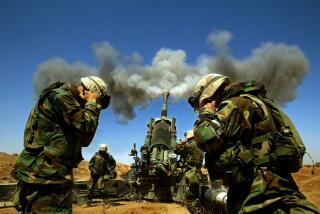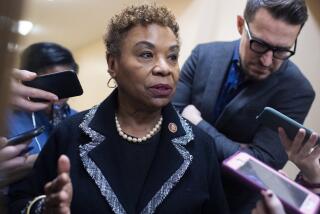Parties Debate War’s Role in Crucial Midterm Election
- Share via
WASHINGTON — Can Republicans wield the war against terrorism as a weapon against Democrats in this year’s midterm elections?
Karl Rove, President Bush’s top political advisor, is arguing that GOP congressional candidates can build their campaigns around the administration’s success in prosecuting the war. But history suggests that won’t be easy.
In the first election after the beginning of each of the five major U.S. wars in the last century, the president’s party has lost seats in Congress. That’s been true whether the war at the time was going well (as in World War I) or badly (as in World War II, Korea and Vietnam) or just gearing up (as in the Persian Gulf).
This year might be different, some analysts say, because terrorism represents a more direct threat to voters on the home front than any of those earlier conflicts. But the precedent is that, in congressional elections at least, traditional domestic concerns have tended to overshadow war.
“It really gets back to [former House Speaker] Tip O’Neill’s observation that all politics is local,” said presidential historian Robert Dallek.
Yet even if Democrats can limit the war’s influence in the midterm election, some key party strategists fear that Rove’s argument could prove powerful two years from now, in the 2004 presidential race.
Several recent polls have found Bush opening huge leads over Democrats on issues demanding toughness, such as safeguarding national security and combating terrorism. And that could signal a reversion to the partisan alignment that existed during the quarter century before Bill Clinton, when Democrats led on the issues of social compassion often critical in congressional races but were found wanting in the tests of strength that loom larger in presidential contests.
Republicans “are trusted to lead, and we are trusted to comfort,” said Al From, president of the centrist Democratic Leadership Council.
Rove Sees Voters Trusting GOP
Rove ignited the debate over the war’s potential political influence with a speech at last weekend’s meeting of the Republican National Committee in Austin, Texas. Rove told the RNC that GOP candidates should stress the administration’s record on the war and homeland security in this year’s campaign, when 36 governorships, 34 Senate seats and all 435 House seats are at stake.
“We can go to this country on this issue because they trust the Republican Party to do a better job of protecting and strengthening America’s military might and thereby protecting America,” Rove said.
Democrats reacted with outrage, accusing Rove of politicizing the war. But with the rhetorical fireworks subsiding, professionals in both parties are beginning to analyze whether Rove mapped out an effective strategy.
The strongest evidence for his argument is polls showing that terrorism remains a top national concern and that voters express much more faith in Bush and the GOP to combat it. In a Gallup/CNN/USA Today poll earlier this month, Americans gave the GOP a mammoth 38-percentage-point advantage when asked which party they trusted more to deal with terrorism. Republicans also held a 41-percentage-point lead on military and defense issues and a 26-point advantage on foreign policy.
GOP pollster David Winston said those attitudes will inevitably benefit Republican candidates. “You have many more people focused on defense, foreign affairs and terrorism,” he said. “And if that is how people are making decisions and using those issues, that context is beneficial for Republicans.”
Yet Democrats remain cautiously optimistic that success in Afghanistan won’t tilt the electoral battlefield toward Republicans. That optimism rests on two central beliefs. One is that voters look to the president, not Congress, to provide leadership on the war. The other is that, since the war has enjoyed almost unqualified bipartisan support, few races are likely to feature meaningful distinctions between the candidates on the conflict.
Those two arguments fuse into a widespread Democratic belief that--absent a major new terrorist incident--November’s election will pivot on traditional domestic issues such as the economy. For example, when voters were asked what issues would be most important to their choice in the congressional election, about twice as many cited the economy as cited terrorism and homeland security in a poll released Wednesday by EMILY’s List, a Democratic fund-raising group.
“Think about it: What kind of debate can you get into [in a campaign] about terrorism and national security?” said John Anzalone, a Democratic pollster. “So at the end of the day, you are going to see the dialogue in October 2002 be about the same old . . . differences in philosophy.”
Steve Schmidt, the communication director at the National Republican Congressional Committee, disputed such assertions. Although there has been little dissension on the war itself, he said, Democratic members who had voted to cut defense spending “may be vulnerable . . . in a political environment where the American people once again understand the importance of a strong defense.”
Still, Republicans seem to be hedging their bets. Notwithstanding Rove’s declaration, Bush this year has focused mostly on domestic concerns, particularly the sputtering economy, in an aggressive schedule of travel around the country.
If the White House is to make the war a winning issue in congressional elections, it will have to buck the trend formed after the last century’s five major wars. For good measure, the Democrats were trounced in 1946, the first election after winning World War II, and Republicans were spanked in 1954 after settling Korea a year earlier.
No common cause explains all of these losses, historians say. Dissatisfaction with the war contributed to some of the reversals (such as in 1942, 1950 and 1966), but in all cases domestic dissatisfaction (such as an unpopular farm bill in 1950 or urban race riots in 1966) loomed large too. The most consistent pattern is that even battlefield success hasn’t protected presidents against the usual voter inclination to reward the party out of the White House during midterm elections.
Probably the closest precedent to the strategy Rove suggested came in 1918. On the brink of Germany’s surrender in World War I, President Wilson publicly asked the country to elect a Democratic Congress as proof that Americans “wish me to continue to be your unembarrassed spokesman in affairs at home and abroad.”
The Democrats promptly lost 19 House seats and six in the Senate, giving Republicans control of both chambers.
Presidents Haven’t Fared Much Better
The initial presidential elections that follow the outbreak of war haven’t been kind to the commander in chief’s party either. The party out of the White House won the first presidential election after the onset of hostilities in every major war in the 20th century except in 1944, when Franklin D. Roosevelt won his fourth term.
Historian John Milton Cooper said that record probably results from an accumulation of wartime frustrations--from higher prices and increased government control over the economy to lengthening casualty lists.
Yet many analysts believe that a Bush reelection campaign would benefit from the war on terrorism much more than his party may in 2002. Though terrorism may fade somewhat as an issue if the country is not attacked again, Bush’s handling of the conflict has largely erased public doubts about whether he has the qualifications to be president, polls show. And the lingering sense of vulnerability to terrorism could prompt voters to weigh a challenger’s credentials as a potential commander in chief much more heavily than they have since the Cold War’s end.
“In 2004, the Democratic nominee has to cross a security threshold we haven’t had to cross since the fall of the Berlin Wall,” From said.
(BEGIN TEXT OF INFOBOX / INFOGRAPHIC)
Post-War Congress
The first congressional elections following the onset of a major war haven’t been kind to the party of the commander in chief:
Year of election: 1918
World War I
Party in White House: Democrat
House seats lost: 19
Senate seats lost: 6
Year of election: 1942
World War II
Party: Democrat
House seats lost: 55
Senate seats lost: 9
Year of election: 1950
Korean War
Party: Democrat
House seats lost: 29
Senate seats lost: 6
Year of election: 1966
Vietnam War
Party: Democrat
House seats lost: 47
Senate seats lost: 4
Year of election: 1990
Persian Gulf War
Party : Republican
House seats lost: 8
Senate seats lost: 1
Source: Vital Statistics on Congress
More to Read
Get the L.A. Times Politics newsletter
Deeply reported insights into legislation, politics and policy from Sacramento, Washington and beyond. In your inbox twice per week.
You may occasionally receive promotional content from the Los Angeles Times.






